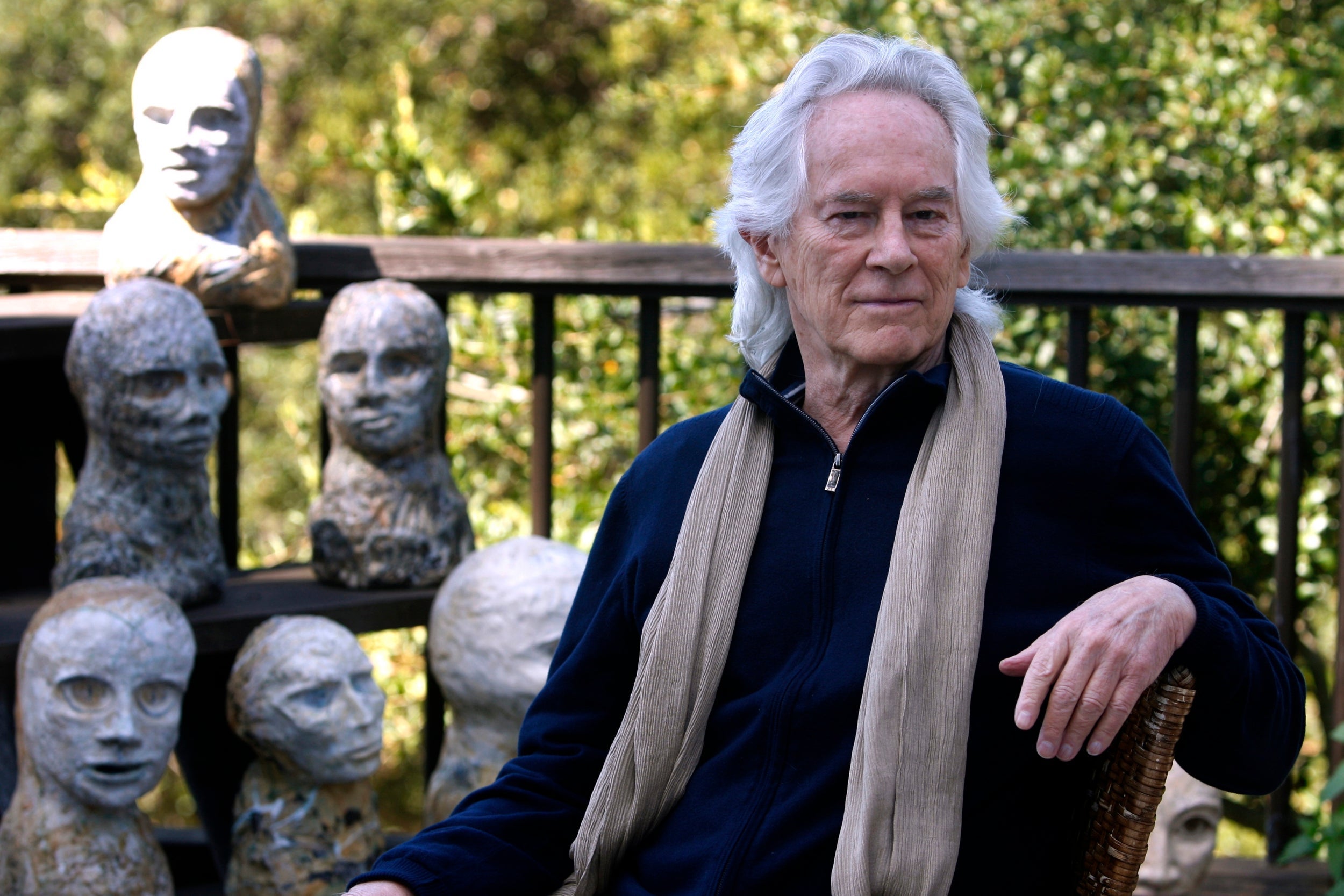Michael McClure: Poet who helped to define the Beat generation
His verse, mixing free expression, jazz idioms and mysticism, stood alongside that of Allen Ginsberg in the 1950s

The American poet Michael McClure, who has died aged 87, was a key figure in a 1955 San Francisco poetry reading that is considered the founding moment of the Beat generation.
McClure was 22 and relatively new to San Francisco when he was asked to organise a poetry reading at a converted auto garage called the Six Gallery. He enlisted the help of fellow poet Allen Ginsberg.
The reading took place on 7 October 1955, with readings by Ginsberg, McClure, Philip Lamantia, Gary Snyder and Philip Whalen. McClure read several works, including “For the Death of 100 Whales”, one of the first poems about environmental awareness. Ginsberg gave the first public reading of “Howl”, the fevered urtext of the Beat movement, beginning with the line: “I saw the best minds of my generation destroyed by madness, starving hysterical naked.”
The master of ceremonies was the poet Kenneth Rexroth, and among the 100 or so people in the audience were the poet and bookstore owner Lawrence Ferlinghetti and the novelist Jack Kerouac, drinking from a jug of wine and shouting, “Go, go, go!” Less than two years later, Kerouac published his seminal Beat generation novel On the Road.
McClure would become known as one of the founders of Beat poetry, a performance-driven form of free expression, inspired by the rhythms of jazz and the mingled insights of eastern religions, erotic experiences and wild peyote visions.
“The world that we tremblingly stepped out into in that decade was a bitter, grey one. But San Francisco was a special place,” he wrote in Scratching the Beat Surface, a 1982 essay collection. “We saw that the art of poetry was essentially dead – killed by war, by academies, by neglect, by lack of love, and by disinterest. We knew we could bring it back to life.”
McClure stayed in the Bay Area for the rest of his life, writing poetry and plays, teaching and serving as a bridge between the Beat generation and the rock era. He wrote the lyrics for Joplin’s “Mercedes Benz” – “Oh Lord, won’t you buy me a Mercedes-Benz” – and sang a version for her while strumming an autoharp given to him by Bob Dylan.
McClure appeared in a film directed by the novelist Norman Mailer, was friends with the Doors singer Jim Morrison and the actors Dennis Hopper and Peter Coyote, and drew praise for his poem “Peyote Poem” from Francis Crick, the co-discoverer of DNA.
McClure’s early poetry was often descriptive and drawn from everyday experience. Over time, his poems became more impressionistic, even abstract, as McClure combined observations of nature and biological forms with mystical ideas, profanity and made-up words and syntax meant to evoke ideas and raw feelings. “What we write, or what we paint, or what we sing or do,” he said, “must actually, literally, be an extension of ourselves, or it is meaningless.”
McClure’s readings became forms of performance art, none more dramatic (or disturbing) than when he went to a zoo and read a poem from his 1964 collection Ghost Tantras to a group of caged, roaring lions. The poem ends with McClure roaring, as the lions do back at him.
Michael Thomas McClure was born in 1932, in Marysville, Kansas. After his parents divorced, he grew up mostly in Seattle with his maternal grandfather, a doctor and amateur naturalist.
McClure attended colleges in Kansas and Arizona before graduating in 1955 from San Francisco State University. His artistic influences included William Blake, French Symbolist poets, jazz musician Thelonious Monk and abstract artists such as Jackson Pollock and Clyfford Still.
McClure often designed his poems to appear as symmetrical shapes on the page or else as casually placed words, in the style of Pollock’s drip paintings.
In the 1960s McClure began writing plays, including The Beard, first produced in 1965 and featuring a dream encounter in which actress Jean Harlow meets Western outlaw Billy the Kid. The play ends with a simulated sex act. Early productions were often raided by the police, with the actors getting two rounds of applause: one for the performance, one in solidarity as they were marched out under arrest.
A later play by McClure, Josephine: The Mouse Singer, a parable about artistic freedom in which the characters are portrayed as mice, won an Obie Award in 1980 for best off-Broadway play.
McClure, who also wrote two novels and several nonfiction works, taught at what is now the California College of the Arts for 43 years, retiring in 2006.
He appeared in Martin Scorsese’s 1978 film The Last Waltz, about the final concert of the rock group The Band, coming onstage to recite a portion of Chaucer’s The Canterbury Tales in Middle English.
Beginning in 1988, McClure frequently performed and recorded with Ray Manzarek, the keyboard player for the Doors, reciting lyrics from Doors songs or his own poetry.
McClure wrote dozens of volumes of poetry and continued to give readings well into his eighties. “It’s very important to surprise myself,” he said in 2001. “I’m one of those artists who say: ‘Well, if I knew what it was before I do it, I wouldn’t sit down to do it.’”
His marriage to Joanna Kinnison ended in divorce. He is survived by his wife since 1998, Amy Evans McClure, and a daughter from his first marriage.
Michael McClure, poet, born 20 October 1932, died 4 May 2020
© Washington Post
Subscribe to Independent Premium to bookmark this article
Want to bookmark your favourite articles and stories to read or reference later? Start your Independent Premium subscription today.

Join our commenting forum
Join thought-provoking conversations, follow other Independent readers and see their replies